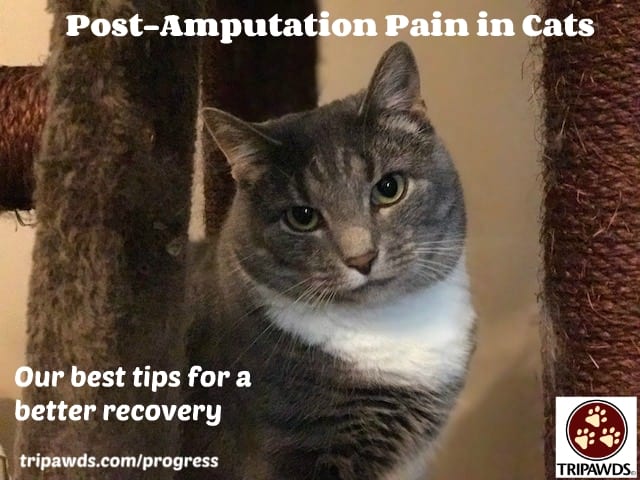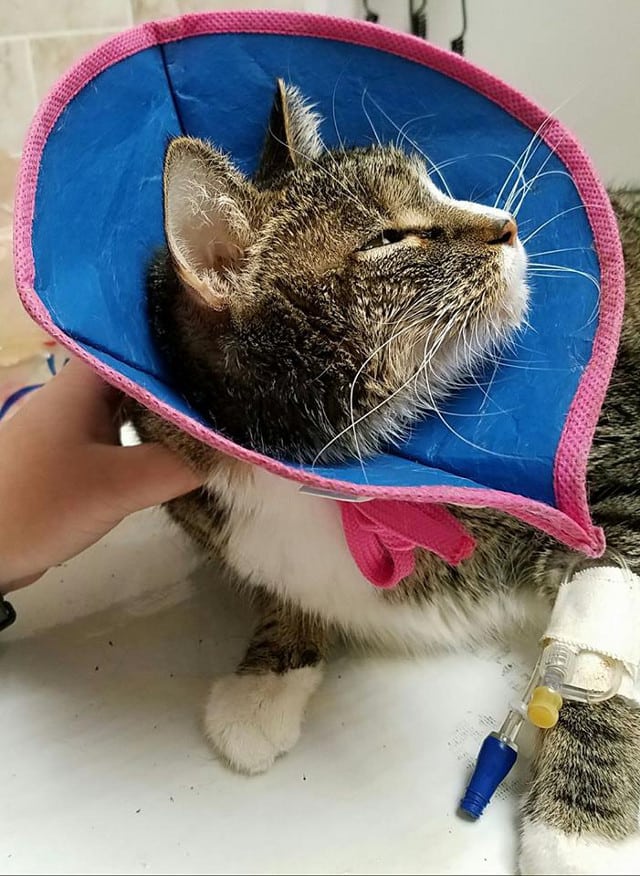Cats and dogs share one big thing in common: they will do anything to hide pain. So today we’re discussing post-amputation pain in cats.
Cats are masters at hiding pain.

When your cat comes home from surgery the first few days can be challenging as you try to figure out if your cat has adequate pain control, or not enough. If you’re struggling with this, here are some tips from our e-book, “Cool Tips for Tripawd Cats,” that can help you during this tough time.
Nearly every new Tripawd parent reports that their cat’s behavior during the first few nights after surgery includes rapid breathing, more vocalizing, anxiety, inappetence (refusing to eat) and just acting weird. Many cats may seem depressed and become constipated, sometimes for up to a week.

These behavioral changes are often from pain medication side effects. Try to remember that whenever you take a pain pill yourself, you are prepared and know what to expect. Your cat, however, has no idea that painkillers can make her see pink elephants and feel dopey. The resulting behavior is lethargy, confusion and what you might consider to be depression.
We’re not saying that your cat isn’t feeling badly, because she is. But that sad look on her face isn’t anger or regret over the amputation – animals simply don’t possess an understanding of such complex human emotions. However, that’s not to say they don’t feel pain. Just like us, they do.
Manage Post-Amputation Pain in Cats by Staying Ahead of It

It’s important to manage your Tripawd cat’s post-amputation pain well and stay ahead of it. Here’s how you can do it.
Know what cat pain looks like. Cats are extremely stealth about showing weakness, even more than dogs! Here are some ways they often do:
- Less desire to interact with people and animals
- Sleeping in an unusual position or location
- Unusual aggression when approached
- Resisting handling or being picked up
- Decreased grooming and mat formation OR increased grooming in specific areas
- Stiffness or limping
- Changes in personality
This pain checklist cats can help translate what your cat is trying to tell you.
Stay ahead of the pain. It is more effective to prevent pain than to try to alleviate existing pain. In other words, using pain medications in anticipation of pain is more effective than waiting until the pain already exists. Before leaving the hospital, know the right way to do this. Ask your vet:
- How often to give the pain medications?
- What to watch for if your cat needs more frequent doses?
- Which kind of side effects can happen?
- What happens if you miss a dose?
Don’t wait until the pain is so bad it’s obvious. By then, an animal is likely experiencing horrific pain that would put any human in the hospital.
Take notes, then call your vet asap to discuss what you’re seeing. Please ask your vet for a clear action plan for treating the pain. Sometimes all it takes is rest and medication. Other times managing animal pain may require additional support from a certified animal rehabilitation therapist.
If you’re not seeing improvement in your cat after following your vet’s plan, let the vet know. If the vet seems stumped, ask for a referral to a veterinary pain management specialist who belongs to the International Veterinary Academy of Pain Management. These vets are on the leading edge of pain management studies and treatments.

Pain control is one of the most challenging aspects of amputation recovery. Keeping the lines of communication open with your vet is an important step to help your cat have a smoother amputation recovery.
People I’ve talked to about amputation (who have gone through it with their pets themselves) have been kind enough to tell me that vets have extremely different approaches when it comes to pain management. Apparently theories have changed over the years, so vets trained in the recent-ish past may not do as much to PREVENT pain as they do to treat the pain once it occurs. This is an issue, because there are things that can be done to prevent some of the pain from ever occuring. – TriKitty Fang’s story, “Pain Management – Dealing with Vets.”
Recommended Reading
What to Expect When You Pick Up Your Tripawd from the Clinic
What to Expect on Amputation Surgery Day for Your Dog or Cat
Tripawd Cats Pain Management Tips and Tricks
Reading these comments tells me vets just like doctors with hold a lot of truthful information about amputating a kitties leg! This seems cruel & just as painful if not more than letting your kitty just keep her broken leg. An abandoned neighborhood kitty I just took in has had a slight limp for 2 months. Just found out back leg is broken & they want to amputate. Yet she is completely loving,cuddly & playful. She walks & jumps. She eats & uses litterbox a/o difficulty. She shows none of the listed signs of a cat in pain. But guess that will change… how about some posts of rear keg leg amputation if & after healing has occurred. How long does this take
Hi Lisa. First, know that cats are masters at hiding pain. A broken leg is painful whether it’s a human or a cat we are talking about. You’ll find tons of examples of Tripawd cats here. Consider joining the Tripawds Support Circle and ask questions in Cats Q&A so we can support you.
Next, about veterinarians. No they don’t withhold information on purpose. Vets want to help animals more than anything. But you can’t expect all vets to know everything, as Dr. Petty explains in this video. They are human like us, as much as they seem like superheroes. Veterinarians who go the extra mile to keep current on pain management techniques are golden, but they’re not everywhere so it’s up to us as pet parents to advocate for our animals and find those five-star vets. Our community can show you how. Here are posts about why we advocate for AAHA-clinics whenever possible.
we are on day 4 from an 11 year old male rear leg amputation.
i have nothing but regret fr putting him thru this.
if anyone is reading this pre surgery- i do not think this was a good decision. i think it would have been more humane to have euthanized him.
Beth, we are sorry for the tough time. Please tell us why you feel this way. Is your cat’s pain management not good? Typically this is the case. We can help you pinpoint the symptoms so that you can have a good conversation with your vet and get your cat well again. I urge you to please please please post in our Three Legged Cats Forum so we can support you.
This article helped me. My cat had to get his front leg amputated 5 days ago cause he somehow fractured it. I’ve looked on google and can’t find any answers, but my cat will random wake up freaking out during naps. I just witnessed him wake up and flip backwards. It scared me. Does anyone know why this may be happening? Could it be him moving and accidentally hitting his incision and it hurting and that freaks him out? We really aren’t sure but I was curious if anyone knew or has gone through the same thing. He was an outside cat but now he will probably have to be inside.
Thanks for the comment Ali, you are not alone. Search the Three Legged Cats Forum for plenty of topics from others discussing similar symptoms. And don’t miss this post about strange behavior in recovering cats.
My cat did the same thing but only for the first day but I’m on day 4 and he can walk but he won’t he just lays in the same spot he ate and drank one time
Hi, my 13.5 year old cat (Misty) had to get her front right leg amputated due to a benign tumour. This was 3 weeks ago and she is doing amazing and we are extremely proud of her. She is starting to act a bit strange and is hissing and meowing a lot, I feel so sorry for her. She is still having pain relief once a day. I’m not sure if she is still in pain but I’m assuming that she is and I think she’s maybe depressed. She still has cuddles and purrs a lot but then she looks at where leg was and hisses and growls. Any advise would be appreciated. Thanks
Hi Frances & Misty. First, please consider joining and posting in our 3-Legged Cats Forum so you can get more input from the community. About her pain, yes that’s what it sounds like. Something is bothering her and it’s best to have your vet examine her to find out where it’s coming from. She could be having phantom leg pain, which is not at all uncommon. Typically a course of consistent Gabapentin and possibly dry needling acupuncture helps get rid of it. Either way, please get her to your vet or consider seeing an animal rehabilitation therapist. Tripawds Foundation can pay for your first rehab visit up to $200. Hope to see you in the Forums!
I am a volunteer with our local humane society and have recently adopted a tripawd cat who is 6 months old. He had a shattered femur but no one really knows why. He is a Maine Coon who was surrendered by the owner who apparently did not realize he had the injury, though he was limping when the humane society received him. He is two weeks post-op and seems to be healing well, but he is depressed and sleeps a lot. I have recently gotten him in the past couple of days, so I was not around during his initial post-surgical days. I know he has been through a lot. Apparently, he had two brothers at the time of surrender, so was probably bonded with them so he is probably missing them. He then went to one foster home, then another one immediately post-op, and then to me.
How long do you recommend they be treated for pain? Also are there any supplements that would be beneficial to him as he recovers or even for his lifetime?
Thanks,
Brenda
Hi Brenda, thank you for helping this kitty through his recovery. We aren’t vets so can’t give you specifics on dosages and timing, but generally most cats and dogs are on pain control for 10-14 days. What is he on, how often, and how much? Be sure to post in the Tripawds Discussion Forums so everyone can help you OK? Also, a rehab therapist can answer questions about his physical activity, supplements etc. And our Tripawds Foundation can pay for his first rehab visit for his new forever human. Check out Cool Tips for Tripawd Cats too. Hope to see you in the Forums!
This blog eased my mind. I literally just got off the phone with the ER vet with questions about the symptoms days after limp amputation.
My cat Bella has her entire right front limb removed because of cancer. It came back a second time and needed Limb removal for survival.
Her side effects are exactly what’s stated in the article. In fact the reason I called the ER was bc her breaths were 48 per min and I knew that wasn’t normal. I didn’t take in account she wasn’t prescribed pain meds and what was In her system left. Very thankful I found tripawds. All of this is new to me and most of the articles I’ve come across are so very accurate.
Lindsey, we are sorry you and Bella had to join our club but so glad you found us. Thank you for the kind words about the article. We try hard to present vet-approved information and appreciate that you are finding it so helpful. Please consider joining us in the Three Legged Cats Discussion Forum to share your experience and lean on us for support. Hope to see you there! And best wishes to you and Bella for a speedy recovery.
Hi Lindsey. Just read about Bella. How is she doing after those couple months?
My 4yrs old Mia got her right front leg amputated 11 days ago! It is really stressful on my Cat Mom Heart… she sleep almost 24/7 for the first 5 days post op… Being more awaked, I noted attitude change in days 6 to 11 post op. She always moewing in screams , as become bitting agressive when touch as certain times. I got her pain med renewed and am very strict on the routine of giving it… She seem to always be in a panick ready to attack mode, scared to leap, move or be touched.
How did it go with Bella? Any word to help a broken hearted cat mom to feel better?
Simonne, since this post and comment are rather old, post in the Three Legged Cats Forum for much more support from other members. And don’t miss all our best tips for tri-kitties!
Hello my male cat is 9 months old and gotten hit by a car and had to have his left back leg amputated we have put him in a crate at home 2 days after surgery because he stayed over night a few nights after. He’s wanting to get out I let him out to do his business and to eat because he has a cone so i have to take it off for him to eat then put it back on.. any advice when he’s able to just walk around the room I don’t want to rush things but he just seems to want to move. Thank you
Hi Courtney. Sorry to hear about your cat! Poor guy. Glad that he lived though! Have you seen our free Tripawd Cats Discussion Forum topic, or our e-book Cool Tips or Tripawd Cats? Both are filled with tons of tips about recovery. In short, you should always leave the cone on him unless he cannot eat with it on. Be very mindful though, cats can destroy stitches under our very noses! As for letting him move around, we recommend keeping him in a small room where he cannot get into trouble like getting stuck in furniture or under the bed. You’ll find all that and more in our Forums and book so please hop on over and check it out. Best wishes to you both!
My cat is a year old and also had his back left leg amputated and the first two nights he was in a room by himself but now he’s out and about just like my other cats but he lays in the same spot like he’s depressed his pain meds are gone because there was only three days I’m on day 4 and he still just lays around he went to the food bowl and the water bowl one time I don’t know if he’s used the box because I have to go to work but he was laying in the same spot when I got home that he was when I left
Carmen, this sure sounds like your cat is in pain. Please advocate for better pain control for your cat. Three days of medication is not enough. Call your vet to let them know your cat’s symptoms and ask for Gabapentin to help him feel better. And join us in our Discussion Forums too so we can help. See you there!